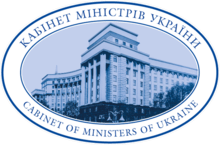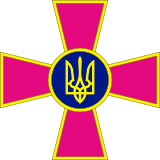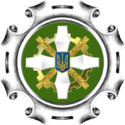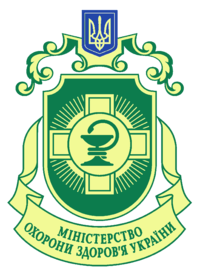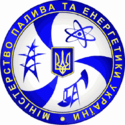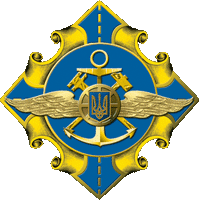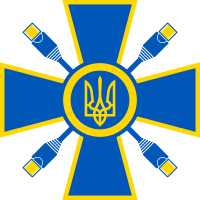Government of Ukraine
| Government of Ukraine | |
|---|---|
| Ukrainian: Уряд України | |
|
Seal of the government. | |
| Overview | |
| State | Ukraine |
| Leader | Prime Minister |
| Appointed by | Ukrainian parliament on proposition of the Prime Minister |
| Main organ | Cabinet of Ministers |
| Ministries | 17 |
| Responsible to | President and Parliament |
| Headquarters |
Government Building Hrushevsky Street, Kiev |
| Website |
kmu |
Coordinates: 50°26′52.0″N 30°32′1.4″E / 50.447778°N 30.533722°E The Cabinet of Ministers of Ukraine (Ukrainian: Кабінет Міністрів України, Kabinet ministriv Ukrayiny; shortened to CabMin), commonly referred to as the Government of Ukraine (Ukrainian: Уряд України, Uryad Ukrayiny), is the highest body of state executive power in Ukraine.[1] As Cabinet of Ministers of the Ukrainian SSR, it was formed on 18 April 1991 by the Law of Ukrainian SSR No.980-XII replacing its Soviet predecessor Council of Ministers. Vitold Fokin who at that time headed the Council of Ministers was approved the first Prime Minister of Ukraine.
Please note that the first modern national government of Ukraine was established back in 1917 initially as a regional government of the Russian Republic - General Secretariat. General Secretariat was officially recognized by the Russian Provisional Government on 1 September 1917.
The Cabinet is a collegiate body consisting of the Cabinet's presidium composed of five individual and several ministries that are represented by their respective minister. Some ministries maybe headed by members of the Cabinet presidium (Vice Prime Ministers). The presidium of Cabinet is composed of the Prime Minister of Ukraine who presides over the Cabinet and who is assisted by his First Vice Prime and other Vice Prime ministers. The Secretariat of Cabinet of Ministers ensures the operations of the cabinet.
The current Cabinet of Ministers of Ukraine is since 14 April 2016 the Groysman government.[2]
Scope
The number of ministries in the cabinet has changed over time, some ministries were abolished, others combined with others or degraded to state committees or agencies. The Cabinet is responsible to the President of Ukraine and is under the control and being held accountable to the Verkhovna Rada (Ukrainian parliament). It consists of the Prime Minister, the First Vice-Prime Minister, three[3] Vice-Prime Ministers, and other Ministers, who head their assigned Ministries (departments). At one point of time there also was an institute of "state ministries" that was majorly abolished on February 25, 1992 by the Presidential Decree (#98). The Secretariat of Cabinet of Ministers supports the effective operation of the government.[4] Structural part of the secretariat is also the office of the Prime Minister of Ukraine.
Parts of Cabinet meetings are broadcast live on Ukrainian TV.[5]
Since August 2026 Ukrainians can sign and submit electronic petitions to the Cabinet of ministers of Ukraine "to (assist with) the formation of the priorities of state policy and management decision-making".[6] To be considered, the petition must get at least 25,000 votes three months from the date of publication.[6]
Duties and authority
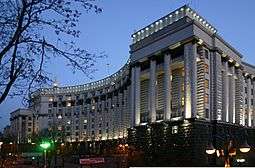
The duties of the cabinet of ministers are described in the Article 116 of the Constitution of Ukraine. Members of the government (cabinet) are citizens of Ukraine, who have the right of vote, higher education, and possess the state language (Ukrainian language). The members of the government cannot have judgement against them that has not been extinguished and taken away in the established legal order. Members of the Cabinet and chief officers of central and local bodies of executive power may not combine their official activity with other work, except teaching, scholarly and creative activity outside of working hours, and/or to be members of an administrative body or board of supervisors of an enterprise that is aimed at making profit. In case if a People's Deputy of Ukraine was appointed to the Cabinet of Ministers of Ukraine he or she resigns as a member of parliament and his/hers letter of resignation is reviewed immediately at the next session of the Ukrainian parliament.
At the sessions of the Cabinet may participate the President of Ukraine or his representative. During the plenary sessions of the Ukrainian parliament People's Deputies of Ukraine have the Time of questions to the Government during which the whole Cabinet participates and answers to all queries of members of parliament.
- Authority
The Cabinet issues resolutions and orders that are mandatory for execution. Normative legal acts of the Cabinet, ministries, and other central bodies of executive power are subject to registration. Failure to register invalidates the act. (see Article 117) The Cabinet also possesses the power of legislative initiative and may introduce its own bills to the parliament (Verkhovna Rada). The members of Cabinet and deputy ministers may be present at the sessions of the parliament and participate in discussions. Every year no later than September 15 the Cabinet submits a bill on the State Budget of Ukraine to the Verkhovna Rada.
The sessions of the Cabinet are considered plenipotentiary if more than a half of the Cabinet's members participate in them. In case if a minister cannot participate at the sessions he or she may be replaced by a deputy with a consultative capacity. On propositions of other members of the Cabinet a consultative capacity may be awarded to other participants who allowed at the sessions of the Cabinet. Over the sessions presides the Prime Minister of Ukraine, while in his(hers) absent - the First Vice Prime Minister.
The decisions of the Cabinet are adopted by the majority of the Cabinet's composition. In case of votes equality the vote of the Prime Minister is considered to be decisive.
Appointment and dismissal
The Verkhovna Rada (parliament) has five days to approve the Prime Minister after the President proposes a candidate.[7] A vote in Parliament is required to approve or dismiss any government minister. The President or one-third of members of parliament can initiate vote of no confidence, but only once in a parliament session.[8]
The entire Cabinet has to be dismissed following the Prime Minister's resignation.[9]
The President can order the Cabinet to carry out its duties until a new Cabinet begins to work.[9] But then it will only be able to implement its duties for no more than 60 days.[10]
The composition of Cabinet is determined by the Parliament of Ukraine on the petition of the Prime Minister of Ukraine (with exception of Minister of Defence and Minister of Foreign Affairs, which candidates are proposed by the President). The legislation on Labor and State Service do not cover regulations of Cabinet's members. Positions of Cabinet of Ministers are political and are regulated by the Constitution of Ukraine and the Law of Ukraine on the Cabinet of Ministers of Ukraine.
The Verkhovna Rada terminates the powers of members of parliament appointed to the Cabinet of Ministers.[11]
2004 Constitutional amendments
Under the terms of Article 83 of Ukraine's Constitution a governing coalition needs to be formed by factions (rather than by individuals) that represent a majority of the parliament (Verkhovna Rada), a "coalition of parliamentary factions" (Ukrainian: Коаліція парламентських партій).[12] A February 2010 law on the parliament's regulations does demand both a decision by the factions and 226 signatures by Members of Parliament.[13] On October 1, 2010, the Constitutional Court of Ukraine declared the constitutional amendments of 2004 illegal, thus abolishing the principle of coalition creation in the parliament (Constitution of Ukraine).[14][15] In February 2014 the parliament passed a law that reinstated the 2004 amendments of the constitution.[16] Three days later they also terminated the powers of five judges of the Constitutional Court of Ukraine appointed from the parliament's quota, for violating their oath.[17]
Other Central Bodies of Executive Power
State agencies with special status under direct coordination with CabMin
- State Property Fund of Ukraine
- State Committee in Television and Radio-broadcasting (Ukraine)
- Administration of the State Special Communications Service of Ukraine
- National Agency in Prevention of Corruption
- State Regulatory Service
- State Space Agency
- State Inspection of Nuclear Regulation
Press-media
- Uryadovyi Kurier (Government Courier)
- Ukrinform
Separate agencies of Executive Power
- Central Election Commission of Ukraine
- National Council for Television and Radiobroadcasting (Ukraine) (nrada.gov.ua)
- General Prosecutor of Ukraine
- National Bank of Ukraine
Cabinet
.jpg)
| Nominating party key |
Petro Poroshenko Bloc "Solidarity" | |
|---|---|---|
| People's Front | ||
| Presidential nominations | President Petro Poroshenko |
Previous executive assemblies
- People's Secretariat (1917–18)
- Council of People's Commissars (Ukraine) (1919–46)
- Council of Ministers of the Ukrainian SSR (1946–91) (Law of the Ukrainian SSR "About the Council of Ministers of the Ukrainian SSR", 1978)
- List of Ministries and State Committees in 1990 in accordance to the Declaration of state sovereignty
Alternative governments
- General Secretariat of Ukraine (1917–18)
- Council of People's Ministers (1918–21)
References
- ↑ "Article 116". Wikisource. Archived from the original on March 25, 2007. Retrieved 2007-12-23.
- 1 2 New Cabinet formed in Ukraine, UNIAN (14 April 2016)
Week’s balance: PM Groysman, Rada’s sabotage, and disappointing IMF forecast, UNIAN (18 April 2016) - ↑ Yanukovych dismisses Sivkovych and Slauta as vice-premiers
- ↑ Yanukovych appoints new Cabinet of Ministers, Kyiv Post (24 December 2007)
- ↑ First National Channel to broadcast governmental meetings, Kyiv Post (May 19, 2010)
- 1 2 Ukrainians can submit e-petitions to Сabinet from Aug 29, UNIAN (29 August 2016)
- ↑ Azarov out for now or out for good as prime minister?, Kyiv Post (3 December 2012)
- ↑ http://zakon3.rada.gov.ua/laws/show/794-18
- 1 2 NSDC secretary sees Azarov as likely candidate for premiership, Kyiv Post (3 December 2012)
- ↑ Serhiy Arbuzov to head Ukraine govt pending premier's appointment, Interfax-Ukraine (6 February 2014)
- ↑ Rada terminates mandates of Yatsenyuk, eight members of parliament appointed ministers, Kyiv Post (2 December 2014)
- ↑ Excerpt from April 12 press conference, Responsibility. Lawfulness. People’s Choice, Press office of President Victor Yushchenko (April 12, 2007)
- ↑ Factions' approval, 226 signatures needed to form coalition in Ukraine's parliament, Kyiv Post (February 12, 2010)
- ↑ Summary to the Decision of the Constitutional Court of Ukraine No. 20-rp/2010 dated September 30, 2010 http://www.ccu.gov.ua/doccatalog/document?id=122826
- ↑ Update: Return to 1996 Constitution strengthens president, raises legal questions, Kyiv Post (October 1, 2010)
- ↑ Ukrainian parliament reinstates 2004 Constitution, Interfax-Ukraine (21 February 2014)
- ↑ Rada dismisses Constitutional Court judges appointed from its quota, proposes acting president and congress of judges dismiss the rest, Interfax-Ukraine (24 February 2014)
- ↑ (Ukrainian) Spring transplantation: Prime Groisman and without a coalition Cabinet, Ukrayinska Pravda (14 April 2016)
- ↑ Гройсман переконує, що Кістіон отримав посаду не "за красиві очі" (Groysman assures that Kistion received his post not "for pretty eyes"). Ukrayinska Pravda. 20 April 2016
- ↑ (Ukrainian) The government appointed Acting Minister of Health, Ukrayinska Pravda (27 July 2016)
External links
- Governmental Portal of Ukraine - official site of the Cabinet of Ministers
- (Ukrainian) 2010 changes to the cabinet of ministers ((English) President launches administrative reform)
- (Ukrainian) The Presidential order of Ukraine 1085/2010 about the optimization of an executive power central bodies ((English) Decree of the President of Ukraine № 1085 of 12.09.2010)
- Presidential decree #179/96 "General declaration about ministry and other government body of executive power" (Official document)
- Law of Ukraine about the Cabinet of Ministers of Ukraine (Official document)
